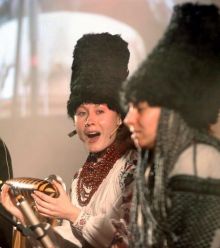When I was getting ready to go study in Paris in September I was looking forward to the exhibition of art works by Johann Georg Pinzel. For some reason I imagined it all like this: posters all over the city, notebooks and postcards with the Sacrifice of Abraham in bookstores, library stand with press is filled with magazines featuring Pinzel on the cover. I imagined it in exactly this order: posters, notebooks, and magazines. I understand that it is very simple, but still…
And now, almost post factum (there is still another month before the closing of the exhibition but most of the posters have been already replaced by others), I would like to say that my dream came true only by a third. There were posters. They were everywhere, even in subway. However, there were no notebooks and postcards. I stopped by a bookstore several times to find the coveted souvenirs – but, perhaps, this wasn’t meant to happen. I had to withdraw all my promises to send “postcards with Pinzel” to all my friends. There was a slight sadness from the fact that I could not do this. However, the mountain of catalogs in the same bookstore, as it seemed to me, thawed quite steadily. This is not surprising: catalogue deserves all kinds of praise!
The third on my personal wish list was a library stand. My hopes were shattered here too. Magazines’ covers rather featured exhibitions with big names: “Raphael” in the Louvre, “Dali” at the Center Pompidou. They mentioned our sculptor only on the page with the advertisements, and even this was not in every magazine. The ad said that such and such exhibition will take place at this and that time in this hall in the Louvre. The same situation was with online media. Some of them, however, were generous enough to put some small comments suspiciously similar. Therefore, there was no expected information sensation. On the other hand, the event was not silenced too, here we should pay tribute to the Louvre press service.
And I would be going around overwhelmed with the feeling of injustice, if it wasn’t for a certain event. This event was not announced by Ukrainian media and did not have the support from the Ministries, but strangely enough it received much more live reviews from the French public than Pinzel exhibition. I am talking about the tour of the DAKH Theater. “Vlad Troitsky,” I read in metro passing by and then stopped and read carefully: “King Lear: Prologue (Monfort Theater, November 28 – December 7), Vij – King of Earth (Theatre de la Ville, December 10-14).” I could still make it for the play!
The Theatre de la Ville was crowded. Despite the expectations, I almost didn’t hear Ukrainian or Russian around. Spacious hall was nearly full. Vlad Troitsky sat in the back row, watching his creation from up high. It is a thankless task to continue telling about what happened next. Those who at least once saw DAKH’s performance would know well what I mean. And those, who don’t know, should get a ticket to a play right away. Let me just say that coming from the small stage of their own theater DAKH actors fell perfectly comfortable on the big stage: well-designed scenery, embracing the entire space (including the audience), and skillful interaction with foreign audience – all of this was breathtaking. There are two French actors playing in Vij – this was done so that there could be a dialogue with the audience. However, the main tongue here is sound, light, and body movements.
When the curtain came down I saw the faces charmed and enlightened with the performance. Therefore, it is not necessary to translate every song of DakhaBrakha or to literally translate every monologue into French, you just need a little bit of the native tongue and then you perceive something deeper, something that has no boundaries.
The next day I browsed the web. There were not many reviews, but those that I found were extremely positive. Emotional notes of bloggers and journalists, not a word copied from the press release (or program). Here is what I found about Vij: “It is true that I understood nothing, or almost nothing, just like the fact that at some moments I was bored, but this night there was such a great atmosphere, universe, different way to do theater, which moved and startled, and made me acquainted with this man, whom I saw in the aisle of the hall of the Theatre de la Ville watching his work, strong and impressive. I would like to get to the Carpathians with the two French-speaking actors whom Troitsky sent ‘in the harsh conditions’ to better prepare for the job. Yesterday I was a child again, who listened to stories read to her before the bed time. Back then I most liked the ones I didn’t quite understand. At the end of the show my hands applauded with a mighty heave, almost in spite of me, and it is very good.”
Here is the review of another commentator about the King Lear: “This exceptional performance in a fascinating lunar aesthetics, significantly enhanced by the supernatural light of Maria Volkova, was a great success: nothing here was left to its own and everything was done at the highest level. Vlad Troitsky led the viewer through the maze of mysterious, dazzling and disturbing universe of archaic times from where the modern man originated…”
DakhaBrakha earned its own recognition. Without their music the performance would lose much of its charm. One of the critics wrote: “I don’t know if I would go to see Troitsky’s play again but if by any chance I would find out that DakhaBrakha plays there I would run there…” And it’s quite nice as for the debut before French audience.







